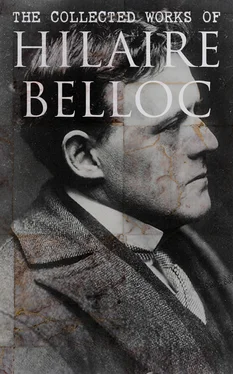It was an inn with trellis outside making an arbour. In the yard before it many peasants sat at table; their beasts and waggons stood in the roadway, though, at this late hour, men were feeding some and housing others. Within, fifty men or more were making a meal or a carousal.
What feast or what necessity of travel made them keep the night alive I neither knew nor asked; but passing almost unobserved amongst them between the long tables, I took my place at the end, and the master served me with good food and wine. As I ate the clamour of the peasants sounded about me, and I mixed with the energy of numbers.
With a little difficulty I made the master understand that I wished to sleep till dawn. He led me out to a small granary (for the house was full), and showed me where I should sleep in the scented hay. He would take no money for such a lodging, and left me after showing me how the door latched and unfastened; and out of so many men, he was the last man whom I thanked for a service until I passed the gates of Rome.
Above the soft bed which the hay made, a square window, unglazed, gave upon the southern night; the mist hardly drifted in or past it, so still was the air. I watched it for a while drowsily; then sleep again fell on me.
But as I slept, Rome, Rome still beckoned me, and I woke in a struggling light as though at a voice calling, and slipping out I could not but go on to the end.
The small square paving of the Via Cassia, all even like a palace floor, rang under my steps. The parched banks and strips of dry fields showed through the fog (for its dampness did not cure the arid soil of the Campagna). The sun rose and the vapour lifted. Then, indeed, I peered through the thick air--but still I could see nothing of my goal, only confused folds of brown earth and burnt-up grasses, and farther off rare and un-northern trees.
I passed an old tower of the Middle Ages that was eaten away at its base by time or the quarrying of men; I passed a divergent way on the right where a wooden sign said 'The Triumphal Way', and I wondered whether it could be the road where ritual had once ordained that triumphs should go. It seemed lonely and lost, and divorced from any approach to sacred hills.
The road fell into a hollow where soldiers were manoeuvring. Even these could not arrest an attention that was fixed upon the approaching revelation. The road climbed a little slope where a branch went off to the left, and where there was a house and an arbour under vines. It was now warm day; trees of great height stood shading the sun; the place had taken on an appearance of wealth and care. The mist had gone before I reached the summit of the rise.
There, from the summit, between the high villa walls on either side--at my very feet I saw the City.
And now all you people whatsoever that are presently reading, may have read, or shall in the future read, this my many-sided but now-ending book; all you also that in the mysterious designs of Providence may not be fated to read it for some very long time to come; you then I say, entire, englobed, and universal race of men both in gross and regardant, not only living and seeing the sunlight, but dead also under the earth; shades, or to come in procession afterwards out of the dark places into the day for a little, swarms of you, an army without end; all you black and white, red, yellow and brown, men, women, children and poets--all of you, wherever you are now, or have been, or shall be in your myriads and deka myriads and hendeka myriads, the time has come when I must bid you farewell--
Ludisti satis, edisti satis, atque bibisti; Tempus abire tibi est....
Only Lector I keep by me for a very little while longer with a special purpose, but even he must soon leave me; for all good things come to an end, and this book is coming to an end--has come to an end. The leaves fall, and they are renewed; the sun sets on the Vexin hills, but he rises again over the woods of Marly. Human companionship once broken can never be restored, and you and I shall not meet or understand each other again. It is so of all the poor links whereby we try to bridge the impassable gulf between soul and soul. Oh! we spin something, I know, but it is very gossamer, thin and strained, and even if it does not snap time will at last dissolve it.
Indeed, there is a song on it which you should know, and which runs--
[Bar of music]
So my little human race, both you that have read this book and you that have not, good-bye in charity. I loved you all as I wrote. Did you all love me as much as I have loved you, by the black stone of Rennes I should be rich by now. Indeed, indeed, I have loved you all! You, the workers, all puffed up and dyspeptic and ready for the asylums; and you, the good-for-nothing lazy drones; you, the strong silent men, who have heads quite empty, like gourds; and you also, the frivolous, useless men that chatter and gabble to no purpose all day long. Even you, that, having begun to read this book, could get no further than page 47, and especially you who have read it manfully in spite of the flesh, I love you all, and give you here and now my final, complete, full, absolving, and comfortable benediction.
To tell the truth, I have noticed one little fault about you. I will not call it fatuous, inane, and exasperating vanity or self- absorption; I will put it in the form of a parable. Sit you round attentively and listen, dispersing yourselves all in order, and do not crowd or jostle.
Once, before we humans became the good and self-respecting people we are, the Padre Eterno was sitting in heaven with St Michael beside him, and He watched the abyss from His great throne, and saw shining in the void one far point of light amid some seventeen million others, and He said:
'What is that?'
And St Michael answered:
'That is the Earth,' for he felt some pride in it.
'The Earth?' said the Padre Eterno, a little puzzled . . . 'The Earth? ...?... I do not remember very exactly . . .'
'Why,' answered St Michael, with as much reverence as his annoyance could command, 'surely you must recollect the Earth and all the pother there was in heaven when it was first suggested to create it, and all about Lucifer--'
'Ah!' said the Padre Eterno, thinking twice, 'yes. It is attached to Sirius, and--'
'No, no,' said St Michael, quite visibly put out. 'It is the Earth. The Earth which has that changing moon and the thing called the sea.'
'Of course, of course,' answered the Padre Eterno quickly, 'I said Sirius by a slip of the tongue. Dear me! So that is the Earth! Well, well! It is years ago now ... Michael, what are those little things swarming up and down all over it?'
'Those,' said St Michael, 'are Men.'
'Men?' said the Padre Eterno, 'Men ... I know the word as well as any one, but somehow the connexion escapes me. Men ...' and He mused.
St Michael, with perfect self-restraint, said a few things a trifle staccato, defining Man, his dual destiny, his hope of heaven, and all the great business in which he himself had fought hard. But from a fine military tradition, he said nothing of his actions, nor even of his shrine in Normandy, of which he is naturally extremely proud: and well he may be. What a hill!
'I really beg your pardon,' said the Padre Eterno, when he saw the importance attached to these little creatures. 'I am sure they are worthy of the very fullest attention, and' (he added, for he was sorry to have offended) 'how sensible they seem, Michael! There they go, buying and selling, and sailing, driving, and wiving, and riding, and dancing, and singing, and the rest of it; indeed, they are most practical, business-like, and satisfactory little beings. But I notice one odd thing. Here and there are some not doing as the rest, or attending to their business, but throwing themselves into all manner of attitudes, making the most extraordinary sounds, and clothing themselves in the quaintest of garments. What is the meaning of that?'
Читать дальше












